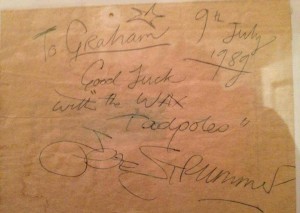The Alarm Strength : An Oral History [Part Two – The Absolute Reality Of Beginning a Second Album 1985]
“We were going to work with Jimmy Iovine – he came down to see us in New York at the Pier 84 Show and was knocked out and really wanted to work with us. We went to meet him in New York at Christmas and got on really well with him and agreed to do the album, and two days before we were due to go in the studio his father became very ill and he had to cancel everything.” – Mike Peters (1985)
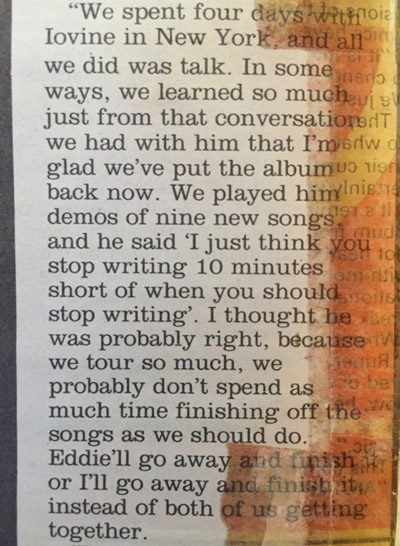
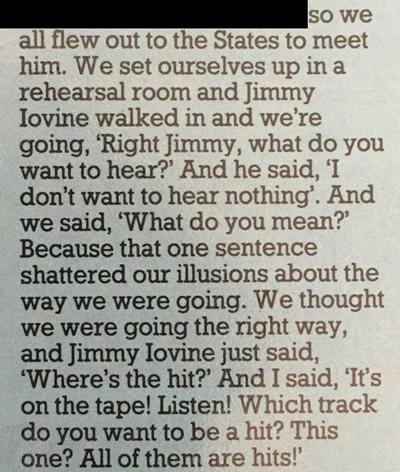
“Jimmy’s pedigree speaks for itself. I have listened to some of the records he has worked on especially Tom Petty’s Damn The Torpedoes, which was a groundbreaking album. I recently watched a programme called Classic Albums and saw the episode with Petty – it really made me sit up as it was plain to see that Jimmy is an instigator. He has a knack for getting the best out of the artists he works with. However, in retrospect I feel he would not have been the right person at that particular moment in time. His decision to work with Simple Minds was probably the right one. Although we had the majority of songs in place, we were still a few short and that was his opinion at the time. Also a major factor would have been the cost, no doubt we would have to record the album in the US which would have been expensive. When you are working in an expensive environment, it creates time pressures that would have meant the album might have been more rushed more than necessary as we were signed to a small record label with limited financial resources. Being rushed in this way could have affected the quality of the final record to its detriment.” – Eddie Macdonald
When January turned to February, there was still no sign of Jimmy Iovine, who kept passing messages on to the bands management via his office that he would be over the following week. Jimmy Iovine never came to Britain, certainly not to work with The Alarm. In the end he cited personal reasons for his non-appearance, and The Alarm were left to cancel the studio sessions and begin the search for another producer.
“By the time we came to record (what would become) “Strength”, we had had two singles which had not made any impact on the top 30, and no producer wanted to touch us. This is why it took so long to follow “Declaration” – Eddie Macdonald
Declaration and The Chant / Absolute Reality producer – Alan Shacklock was now unavailable as he had taken on the production of a new Meatloaf album and so Ian Wilson (The Alarm’s manager), hatched a plan to buy the band some time. Wilson convinced IRS to release the Alan Shacklock produced ‘Absolute Reality’ as a single to promote the U.K. dates in May.
The Alarm already had a slew of radio and TV appearances lined-up, so they embarked on them even though they were no-where in-sight of recording a new album
Jan 5th 1985 The Alarm “Europe a Go Go” TV show, UK Channel 4
January 18th 1985 The Alarm London School of Economics (Charity Event)
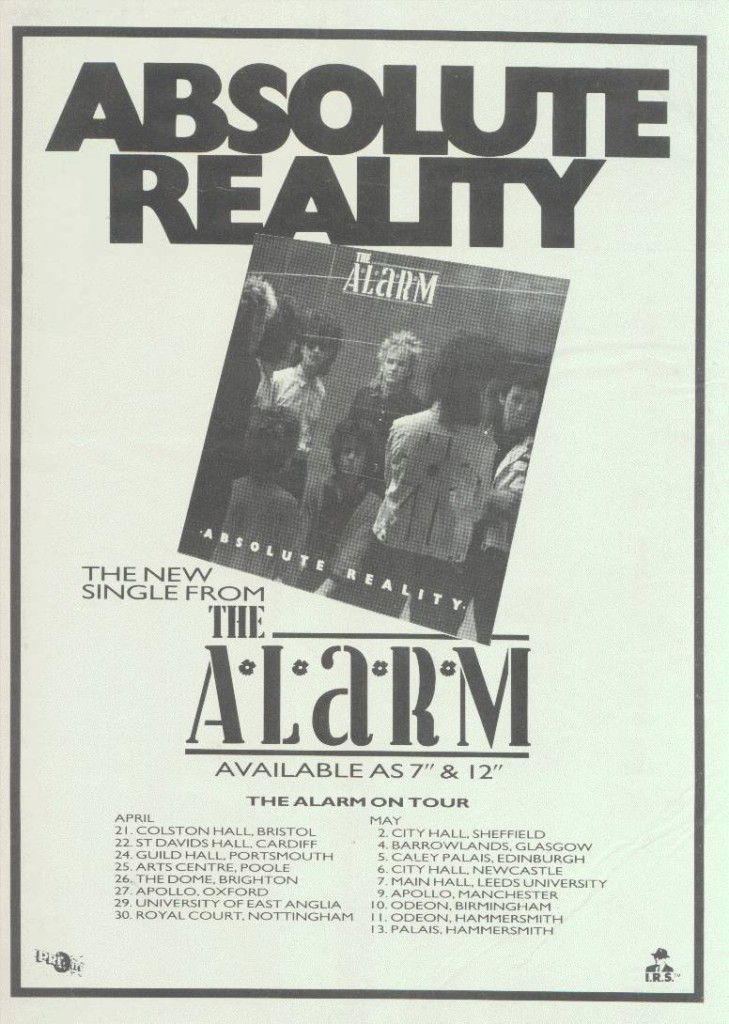
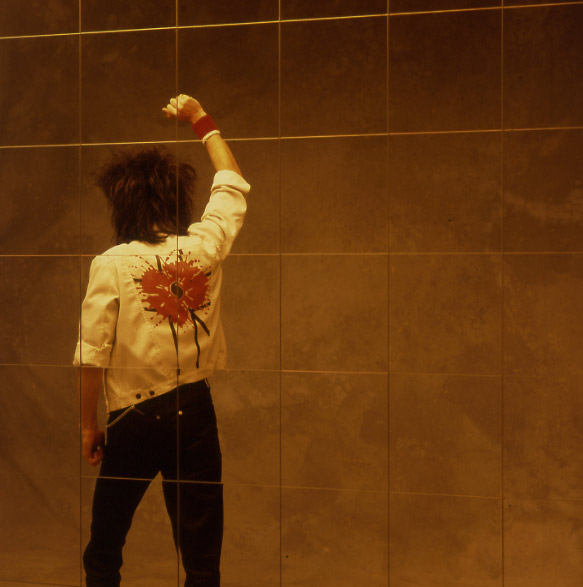
Unseen Photo from Absolute Session 1985 by Eric Watson
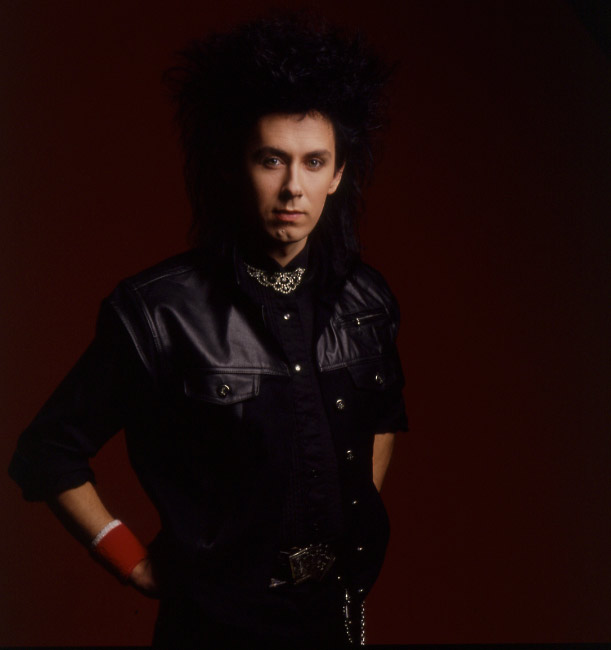
Unseen Photo from Absolute Session 1985 by Eric Watson
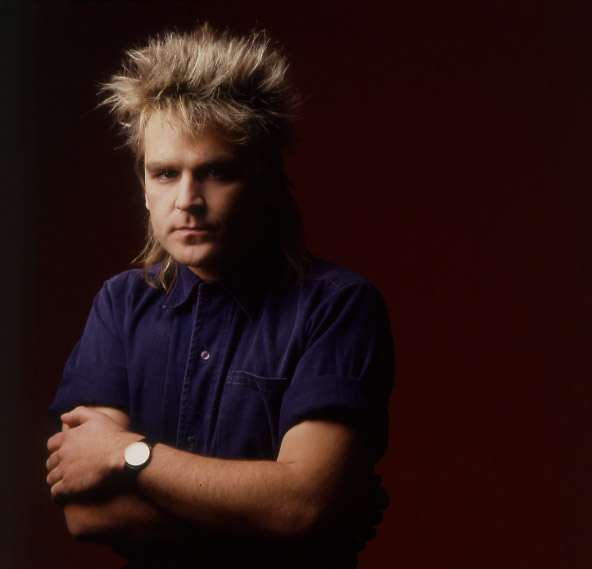
Unseen Photo from Absolute Session 1985 by Eric Watson
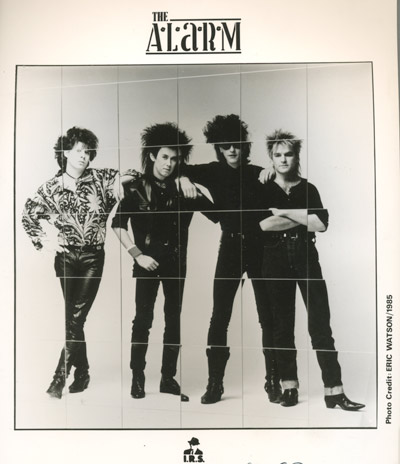
Promo Photo from Absolute Session by Eric Watson
February 18th 1985 Absolute Reality single released in the UK (Reaching #35 on the UK singles chart).
Reaching #35 with Absolute Reality was a great moment for the band. It Re-invigorated them at a time when they needed it most.
“Absolute Reality was an amazing song. The perfect mix of rock, pop and social awareness. I’m sure it infuriated the Alarm’s critics too. For at least a couple months in 1985, it dominated the airwaves in Los Angeles alternative radio. It was unfortunate that The Alarm did not have a whole album of like-songs to back-it-up immediately” –Steve Fulton, Alarm Fan
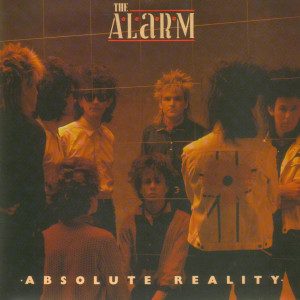
The single was released in a number of formats, including a limited edition 7″” double pack – limited to 10, 000 copies.
“Absolute Reality.” The song was released in the UK on 7″ and 12″ both b/w a version of “Blaze Of Glory” recorded in 1983. An “Absolute Reality” 7″ double-pack was also released. The extra 7″ single included Dave Sharp’s “Reason 36” and the Eddie MacDonald sung “Room At The Top.” Released in February of 1985, the “Absolute Reality” single reached #35 on the UK singles chart. -Steve Fulton, Goldmine, 1995
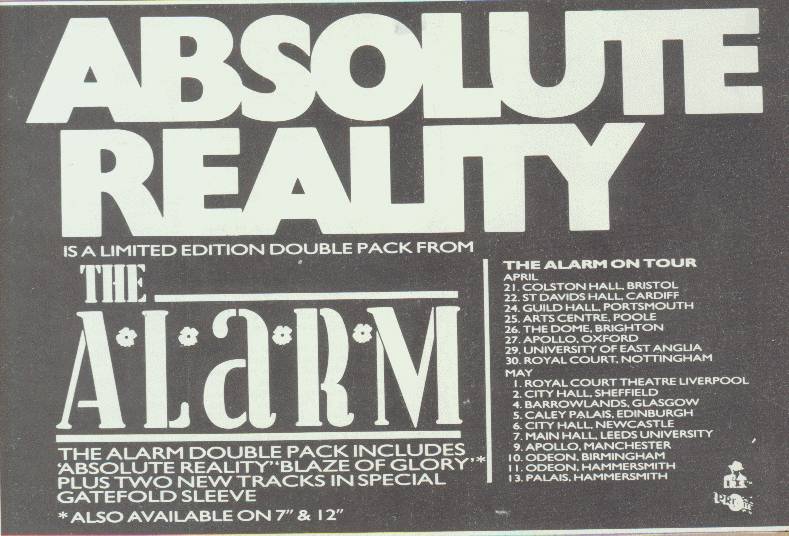
“Ian Wilson and Steve Tannett put together an independent release for ‘Absolute Reality’ (which we had in the can as we had previously recorded it with Alan Shacklock after Declaration but decided not to release). It was a brave attempt to keep the momentum going but in the eyes of the industry we looked weak and instead of coming out all guns blazing with a brand new album building on the success of Declaration, it was like starting all over again.” – Mike Peters (2015 Interview)
February 18th 1985 Bruno Brookes Session – BBC Radio 1
The Alarm performed Sixty Eight Guns, Absolute Reality, Deeside (early version)*, Howling Wind* Featuring Graeme King on piano. *(Tracks available on The Alarm Radio Sessions 1983-1991 CD)
February 21st 1985 Gary Crowley Session – Capitol Radio, London
The Alarm played “Absolute Reality*, Bells of Rhymney*, This Train Is Bound For Glory*, Dawn Chorus* *(Tracks available on The Alarm Radio Sessions 1983-1991 CD)
March 2nd 1985 The Alarm “Saturday Superstore” – BBC1 TV, UK
March 8th 1985 The Alarm “Oxford Road Show ’85” – BBC2 TV, UK
March 11th 1985 The Alarm “Music Box” interview
March 16th 1985 The Alarm “Number 73” ITV, UK
The Alarm performed Absolute Reality and Mike Peters wins the ‘Sandwich Quiz’ against Scottish comedian and TV presenter Billy Connolly. The band perform ‘Howling Wind’ to close the show and are joined for the finale by Billy Connolly and other guests.
Following the disappointment wrought by the disappearance of Jimmy Iovine and the band’s subsequent inability to record their second album as hoped, The Alarm floated the idea of producing themselves but IRS had none of it, and set out to find a producer who had a track record they could trust.
Enter Mike Howlett, who had been the bass player with legendary 70’s hippy band ‘Gong’. He had subsequently made the transition to producer and was having hits with synthpop bands O.M.D. and Blancmange. It wasn’t just these impressive credentials that endeared Mike Howlett to IRS however. Howlett had something else far more important going for him – he was available immediately.
“When we couldn’t get Jimmy Iovine, we had to look for another producer fairly quick. You have to book producers months up ahead of schedule, because they’re trying to work on other albums and things like that. So, when we’d finished the Absolute tour there was really no serious producers available that we could use. We tried to get back with Alan Shacklock, but he was doing a Meatloaf album and tried to help us as much as he could before the sessions started. Alan was helping out in rehearsals when we were doing Majority and stuff like that, but the only producer we could find to work with was a guy called Mike Howlett. Mike used to be the bass-player in a 70’s band called Gong, with Steve Hillage”. – Mike Peters (Alarm 2000 Day Transcription)
Mike Howlett and The Alarm first met in a restaurant in Notting Hill to discuss the possibilities of working together. Howlett liked the demos the band had recorded and they all got along really well together. The thing that The Alarm liked most about Howlett however, was his willingness to record with the band’s ‘live’ sound engineer Nigel Luby. Nigel had already recorded the main album demos with them at Ezee Recording Studios, Kings Cross, London in November 1984 and had a good working relationship with all four members of the band who trusted him completely.
“We went to meet him (Mike Howlett), in a restaurant in Notting Hill and we got on really well with him actually, and he was a good producer for us, because a: he was available, b: he liked to work with the sound engineer that did our gigs, and the other thing that is a bit weird about him is that his main production credits were like Blancmonge and Orchestral Manoeuvres In The Dark. So we booked a recording session in Roundhouse studios, which is in Chalkfarm road in London, and went in to do a sort of trial session. We recorded ‘Knife Edge’ and ‘Dawn Chorus’ as well as the whole jam session that’s on the Absolute tour flexi-disc, that all came out of us during the first night in the studio while we got the sounds set up” – Mike Peters (Alarm 2000 Day Transcription)
March 25th – April 4th 1985 The first recording sessions for the ‘Strength’ album began at Roundhouse Recording studios in Chalk Farm Road, London and continued until the 4th of April 1985.
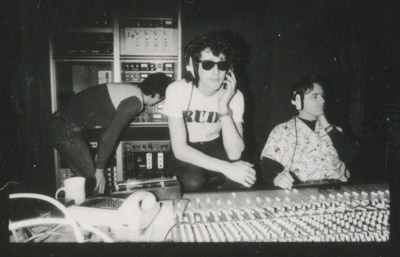
Previously unseen photo of Nigel Luby (bending down), Nigel Twist and Mike Howlett at the Roundhouse Session (Photo Russell Young)
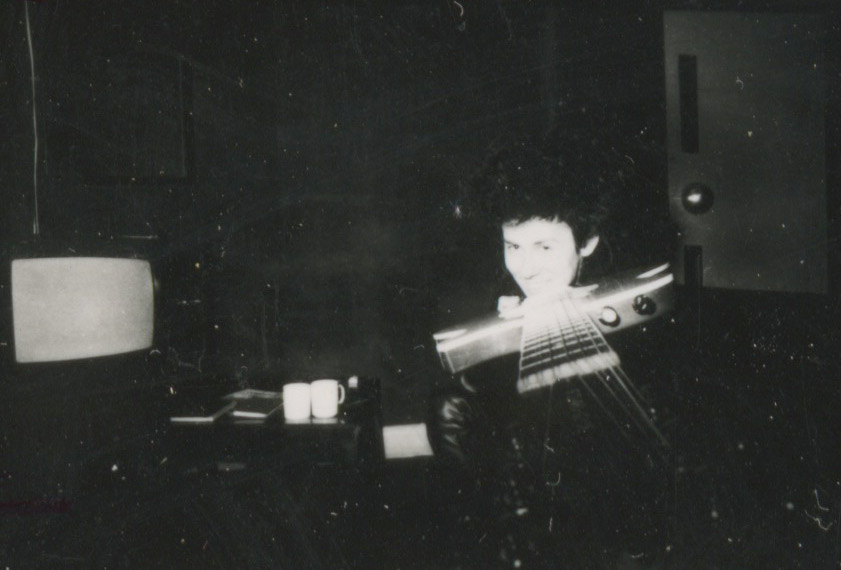
Previously unseen photo of Eddie Macdonald at the Roundhouse Session (Photo Russell Young)
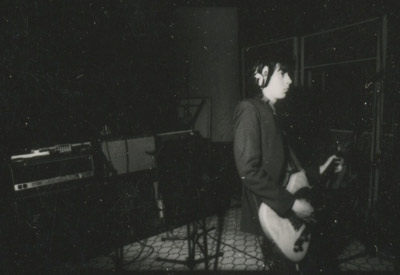
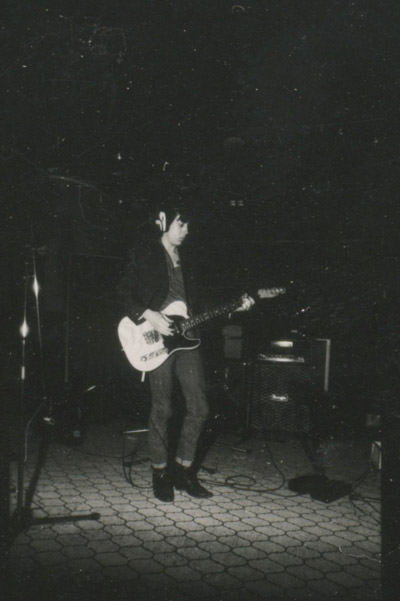
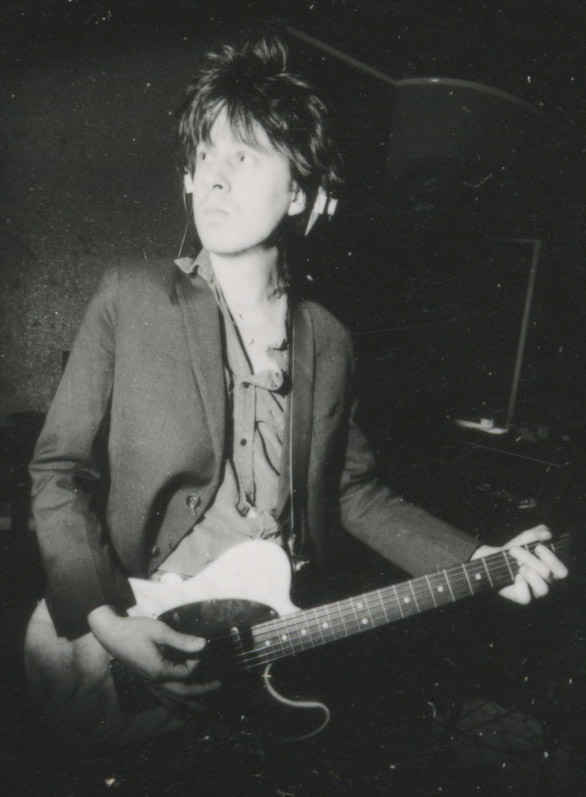
Previously unseen photos of Dave Sharp at the Roundhouse Session (Photos Russell Young)
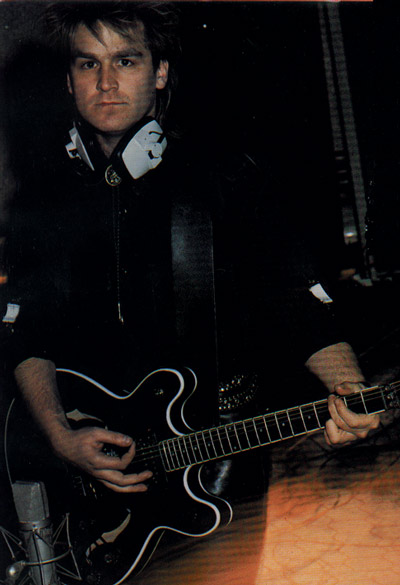
Mike Peters at The Roundhouse Sessions (Photo Russell Young).
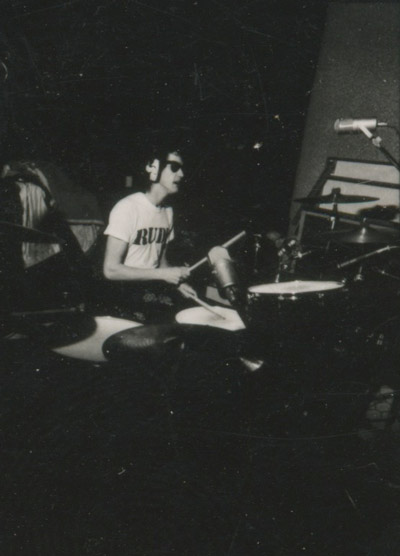
Previously unseen photo of Nigel Twist at the Roundhouse Session (Photo Russell Young)
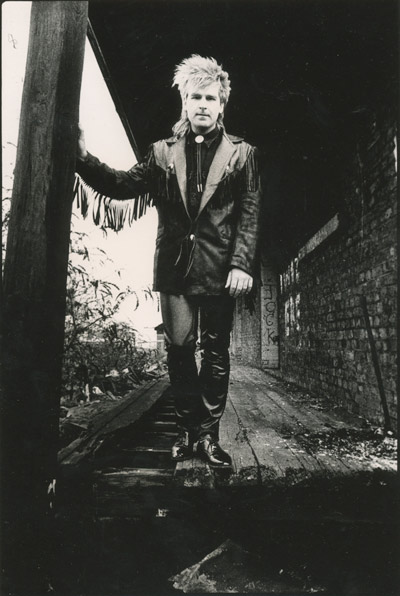
Photo of Mike Peters outside the Roundhouse Studio Session (Photo Russell Young)
The first thing the band recorded at Roundhouse studios on the evening of March 25th 1985, (cut while Mike Howlett and Nigel Luby worked on individual sounds in the control room), was an extended free form jam session. The band worked their way through rough, half-remembered takes of Free’s ‘All Right Now’, Golden Earring’s ‘Radar Love’ and many others, including a lively version of the Seventeen classic ‘Alarm Alarm’ (an early Mike Peters song which had inadvertently lent itself to the name of the band).
During this initial session, the band recorded and completed the tracks ‘Knifedge’ and ‘Dawn Chorus’. Everyone was pleased with the results and all agreed to further sessions after The Alarm had finished the Absolute Tour.
31st March 1985 Mike Peters runs a half marathon at Wembley Stadium, London
Mike Peters got his start running after seeing a friends nephew in a wheel chair with Cerebral Palsy and realizing that he should not take his own health for granted. This event began a life-long obsession for Mike with keeping fit and running long distance.
“I took up running because I’m the sort of person who, if I do go drinking or eating a lot, I put on weight very quickly,” says Peters. “So I like to stay fit. It keeps the weight down, and I don’t have to bother with diets. And last Christmas I met the nephew of a friend of mine. He’s a young chap about 10 years old, and he suffers from cerebral palsy. He can’t move his arms or legs. But he loves music, and his favorite group is the Alarm.
He’d communicate with his parents through music. He’d lift his eyes up and down when he wanted certain things, and his eyes would light up when he heard music. When he’d get his mother to go to the record collection, and she’d put on the Alarm, he’d get all excited.
So here’s me with a physical body that can do anything, and here’s this young lad who can’t do anything other than lift his eyes. And to see how excited he gets when you put on a record. . .
I thought I’d do a few races to raise some money for cerebral palsey funds. But then it was so easy to give up if I just ran once in a while. I’d say, ‘Ah, I can’t be bothered tonight.’ So I thought I’d enter myself in the marathon so there’d be no chance of me giving up. It’d always be in the back of my mind that I’d have to run because I had a long distance coming up.” – Mike Peters, Chicago Tribune, Nov. 15, 1985
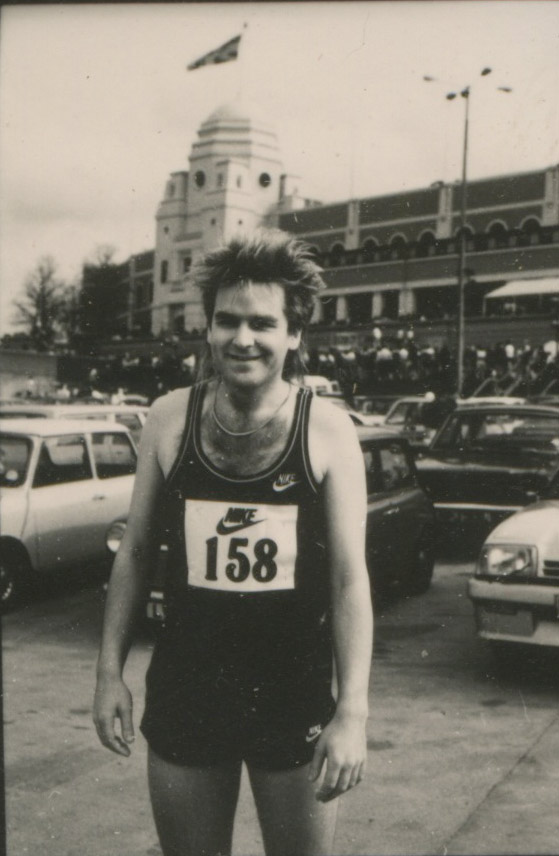
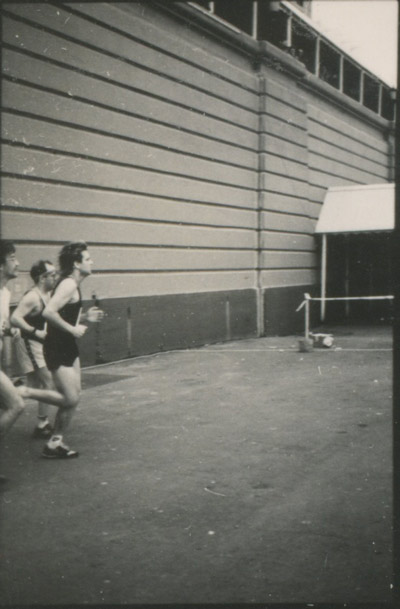
In this interview from later in 1985, Mike Peters talks about his life in London, how he got started running, and his musical friends.
April 7th 1985 The Alarm Breekend Festival, Bree, Belgium (with Killing Joke)
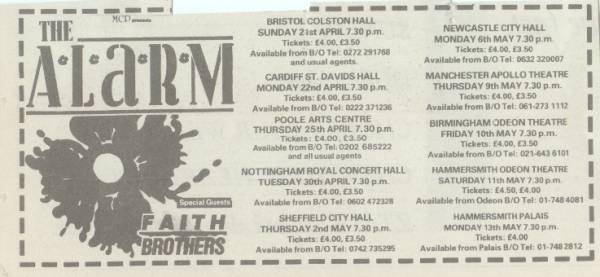
April 20th – May 13th The Absolute Tour
The Absolute Tour had originally been booked to go with the release of an album that would have been finished and released had Jimmy Iovine not pulled out of his engagement to record with The Alarm in early January. Rather than cancel the tour, The Alarm had decided to honour the commitment and use the gigs as a chance to perform their new songs live. The tour program, featured a 7″ clear flexi disc with an audio message from Mike Peters and a cut down version of The Alarm’s studio Jam session from the night of March 25th.
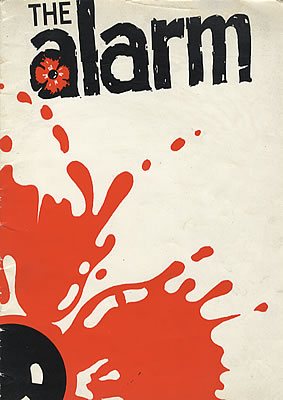
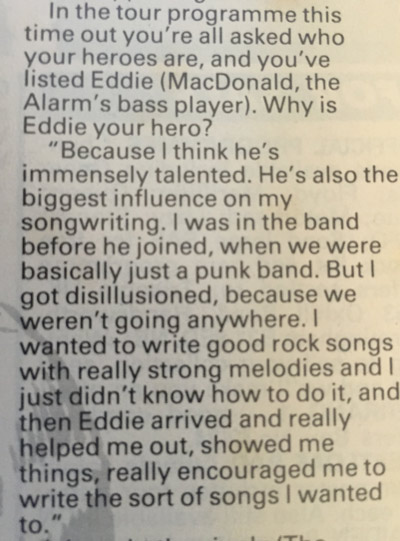
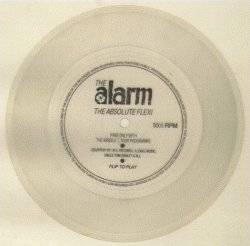
‘The hurriedly named “Absolute Tour” was originally booked as the album tour for the band’s second album, which frustratingly remained unrecorded. Necessity being the mother of invention, we made plans up as we went along. Releasing the single (that had already been recorded with Alan Shacklock), “Absolute Reality” independently. IRS had lost their distribution deal with A&M and yet we achieved better chart success than either of A&M’s “The Deceiver” and “The Chant Has Just Begun”.’ – Ian Wilson
During the Absolute tour, The band used the middle section of the live shows to introduce the new material to their fans.
‘Knife Edge’, ‘Dawn Chorus’, ‘The Day The Ravens Left The Tower’, and ‘Deeside’ were thoroughly road-tested alongside acoustic versions of ‘Walk Forever By My Side’ and ‘One Step Closer To Home’. The tour also provided The Alarm with a platform for improvisation.
The Alarm are supported on the entire Absolute Tour tour by The Faith Brothers.
April 20th 1985 The Alarm Astra Theatre, Llandudno Wales
Recorded for BBC 2’s Old Grey Whistle Test (see broadcast in Strength – An Oral History [Part 4]), and also a charity gig in aid of both the Save the Children Fund & Sudan Appeal.
April 21st 1985 The Alarm Colston Hall, Bristol
April 22nd 1985 The Alarm St. David’s Hall, Cardiff
April 24th 1985 The Alarm Guildhall, Portsmouth
April 25th 1985 The Alarm Arts Centre, Poole
April 26th 1985 The Alarm The Dome, Brighton
April 27th 1985 The Alarm The Apollo, Oxford
“Ian Wilson was encouraging me to develop as a front man of the band and suggested I try to communicate with the audience more than I had done previously. This was the first show I ever played where I sang some songs (starting with Knife Edge), without a guitar. The future members of Radiohead were in attendance and when I opened for them at show in Albany in 1995 they all came to talk to me about this show” – Mike Peters
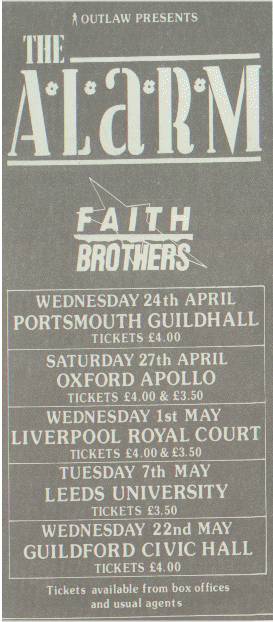
April 29th 1985 The Alarm UEA, Norwich (see exclusive poster image at www.twitter.com/thealarm)
April 30th 1985 The Alarm Royal Centre, Nottingham
May 1st 1985 The Alarm Royal Court, Liverpool
May 2nd 1985 The Alarm City Hall, Sheffield
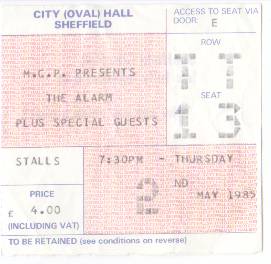
May 4th 1985 The Alarm Barrowlands, Glasgow
May 5th 1985 The Alarm The Playhouse, Edinburgh
Originally planned for The Caley Palace, the gig was moved to the larger Playhouse due to ticket demand.
“Remains the best gig I ever saw even though it was a seated venue and I only had tickets for row GG I rushed the bouncers and got right to the front. They certainly rocked that night. “ – Alarm Fan Antony Greenside via TheAlarm.com
May 6th 1985 The Alarm City Hall, Newcastle
“After the show at Newcastle City Hall on May 6th 1985 at about 3 o’clock in the morning, while the other members of The Alarm slept in their hotel beds, myself and Redeye (ever faithful member of The Alarm road crew, who had moved to London with the band in 1981), were outside in the cold night air, trying to retrieve a guitar from the equipment van. I had been unable to sleep, when I got the idea for a chorus which I thought had real potential. I was afraid I might forget the melody if I slept on it and waited until the next day to work it out properly, so I persuaded Red (whom I used to room with on tour), to accompany me to the van. Once I had the guitar, I was able to finish the rest of the song.” –Mike Peters
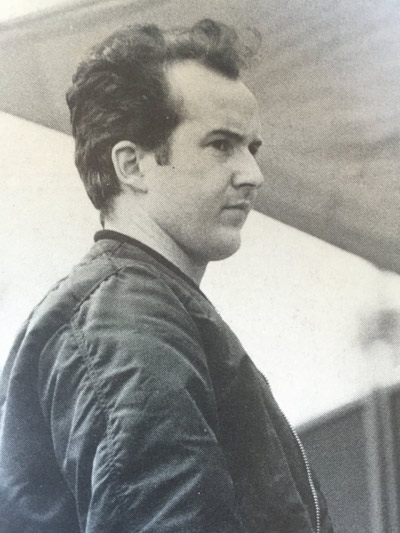
– Photo John Selwyn ‘Redeye’ Edwards
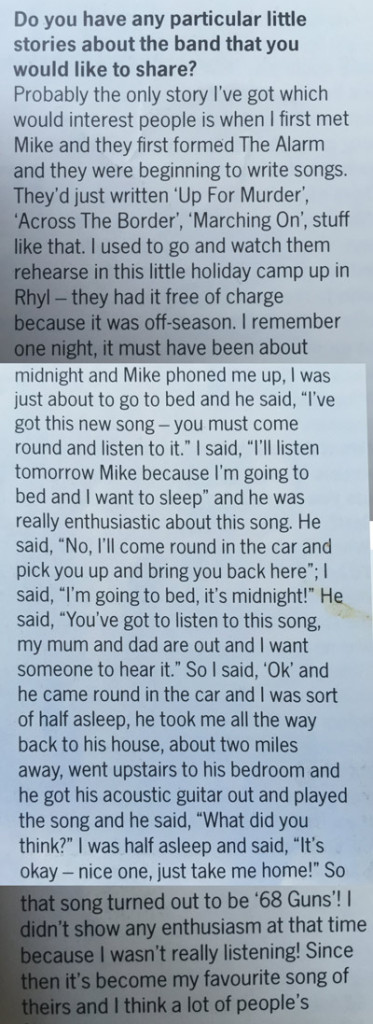
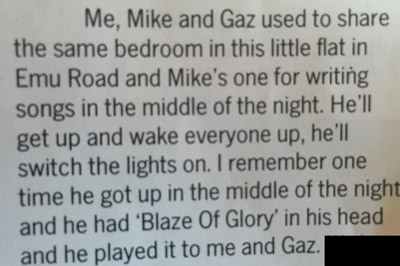
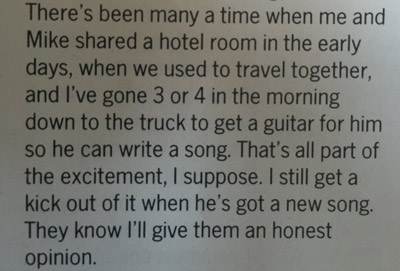
May 7th 1985 The Alarm University, Leeds
May 7th 1895 marked one of the most bizarre turns in the your history of The Alarm. The Alarm had been (frustratingly, mistakenly, wrongly, dismissively — choose your own adverb here) compared to The Clash by the UK music press. The sad part about it, was that The Clash (the remains of the band anyway) believed it. The Alarm had already been supported by Mike Jones B.A.D. the year before which was odd enough, but the events of May 7th were unprecedented.
As The Alarm, were getting ready to play inside, The Clash (MarkII) showed-up and performed an acoustic busking concert outside the venue in Leeds (The University refectory where The Who’s – ‘Live at Leeds’ album was recorded). The band stopepd their sound-check to go watch the proceedings.
“I distinctly remember Redeye bursting on to the stage during the soundcheck and announcing that Joe Strummer and The Clash were busking to the fans outside the venue. I didn’t believe him at first and thought it was a wind-up but soon realised it was true and so I dropped everything and ran outside to see what was going on.” – Mike Peters 2015
“I saw The Clash on this tour, on a late night National Express from Nottingham to Leeds- it was very exclusive- just me, them jamming at the back and the coach driver. Unfortunately I wasn’t into the Clash much then, so didn’t recognise them. I only realised a few days later when there was a report about them busking outside an Alarm Leeds Uni gig in the Uni newspaper. The Alarm came out to watch apparently.” – John 2013 Internet Blog
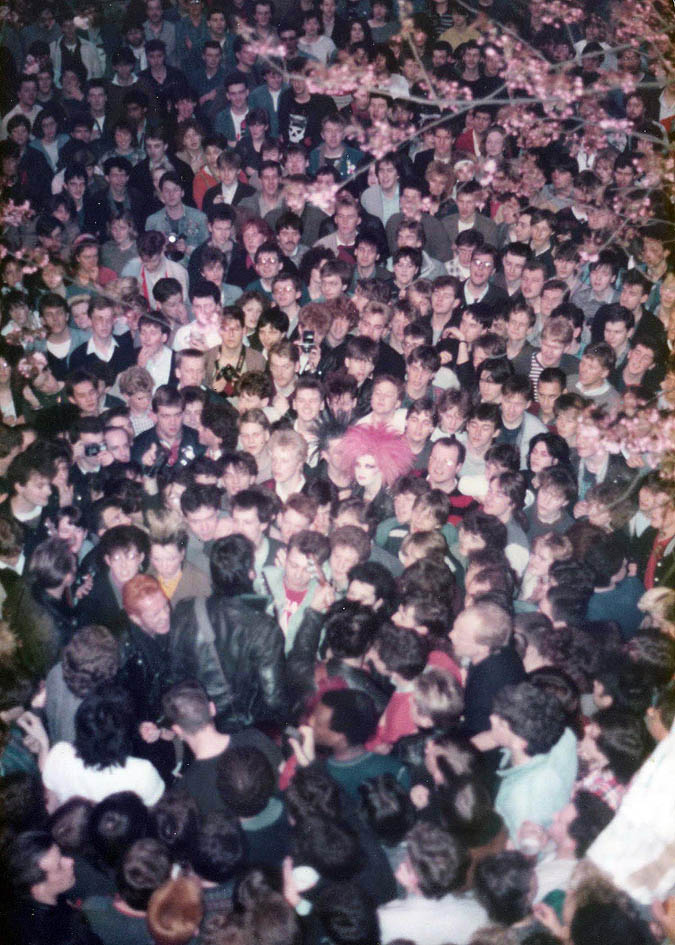
Outside where the Alarm were playing that night, The Clash were disrupted 15 minutes / 4 songs into their set (about 7pm) as Joe Strummer got covered in red paint (which was thrown by members of Chumbawumba from the roof of the University Building), in protest at The Clash being part of CBS Records and the Company’s alleged involvement in the construction of Cruise Missiles.
“Meanwhile, anarchy was becoming archaic in the U.K., as a pallid version of the Clash, sans Mick Jones, roamed the streets in search of lost credibility. They’d done the America, champagne and coke thing, and they came back over here trying to prove that they could still relate to the kids, “To me it just smacked of insincerity; they were doing this tour where they would be busking outside gigs. So [fellow Chumbawumban] Danbert [Nobacon] sprayed them with red paint and then got chased through Leeds City Center by a load of angry people. But he managed to escape.” – Dunstan Bruce (Chumbawumba)
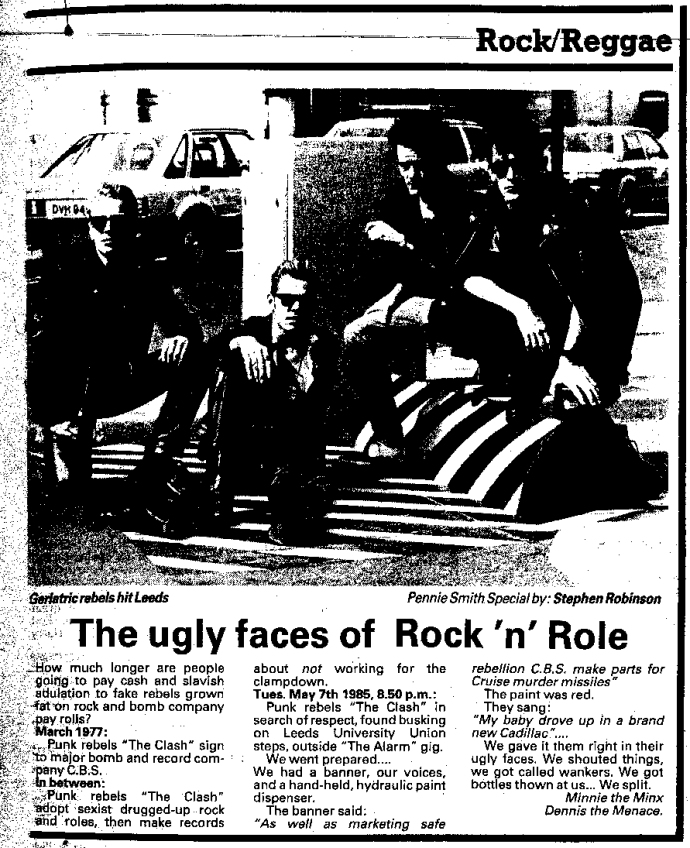
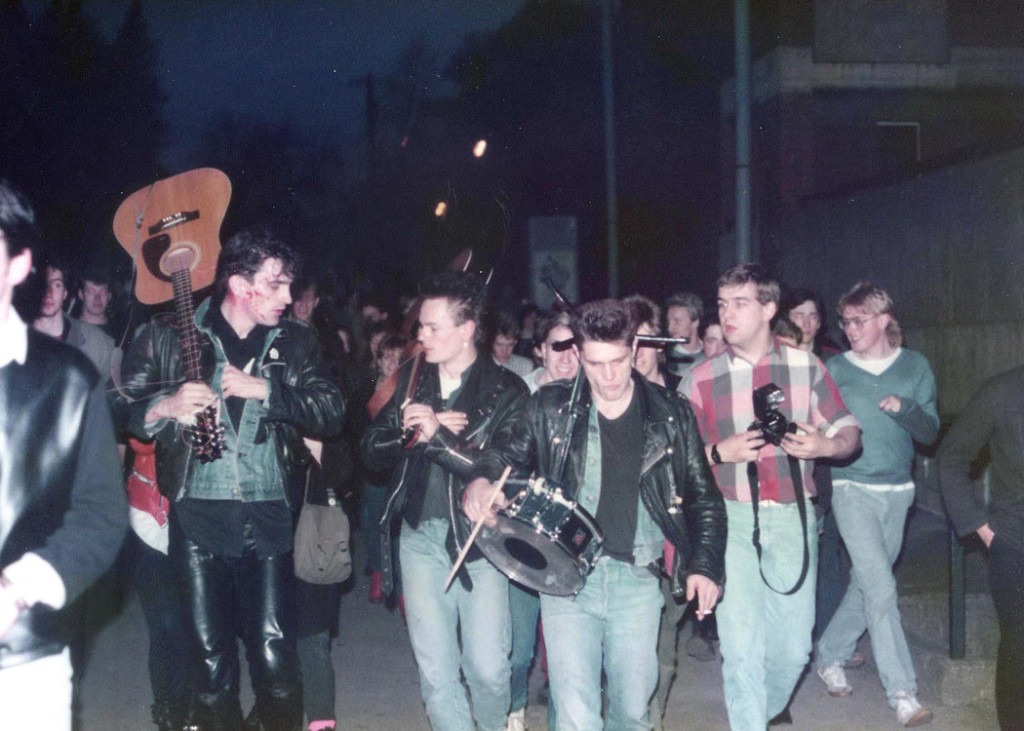
This is such a bizarre and ugly story. The modern equivalent I suppose would be Jack White hating on The Black Keys. Why? Because they sound like a band (The White Stripes) he’s not playing in any more? Jack White actually confronted The Black Keys about it in a restaurant. The Black Keys subsequently called Jack White ‘a bully’ and Jack White doesn’t look better for it. I think Joe Strummer was doing the exact same thing here, with similar results. -Steve Fulton, Alarm Fan
“The Alarm are like the wrapping on a Chocolate Bar” – Joe Strummer
“It was certainly strange to see my hero Joe Strummer outside The Alarm’s gig at Leeds, especially when the paint got thrown around. Even stranger, was seeing the concourse empty as the door to our own gig opened and the fans rushed in to get down to the front. I could see The Clash from about a 100 yards away and I felt sorry for Joe and the band, they were obviously trying to prove some sort of point and in many ways, I could relate to what they were trying to do, especially as it was the way The Alarm had demonstrated itself in the early days after arriving London 1981, and busking on the subways and performing outside the Crypt Folk Club at St. Martins In The Fields Church in Trafalgar Square, when they wouldn’t let us play because of the way we looked. I think another reason they might have been there was driven by the fact that Mick Jones had performed the first ever Big Audio Dynamite show as support to The Alarm in Glasgow Nightmoves in 1984. I can imagine Joe Strummer thinking somewhere in his reasoning that Clash fans had started following The Alarm after they had sacked Mick Jones. In the music press at the time, there had been some verbal comments from Joe saying ‘The Alarm were an imitation of a shadow of The Clash’ and here he was imitating The Alarm with acoustic guitars. The week he died, I got a letter from an old Alarm fan – Graham Lampen, who had met Joe in a restaurant just before he passed away, where Joe admitted to him that he was a fan although he wasn’t allowed to admit it. –Mike Peters 2015
“I met Joe Strummer on the 9th July 1989 in a Notting Hill restaurant. (autograph is in pic below!). You could smoke in restaurants in those days, and I was having a smoke when someone tapped me on the shoulder and said “‘scuse me, mate – can I nick a fag off you?” I turned around and nearly fell off my chair – it was Joe – one of my all time heroes sitting right next to me.
We got chatting, and he asked me and the people I was with, if we wanted to join him – he was with a woman – afraid I can’t remember her name.
Joe was extremely gracious and generous with his time – either that, or he wanted all of my cigarettes! – but we spent a good couple of hours talking. Music was obviously the main topic of conversation, but for every question I asked Joe, he asked me one back. I was in a band called The Wax Tadpoles – he loved the name (it is the literal translation of “Coca Cola” in Japanese!), and had so many words of encouragement.
He asked me who my favourite band were, and knowing what he had said in the past, I almost bottled it and said someone else. But instead, I told him it was The Alarm, and I asked him why he hated them so much, and why he had said that thing about the chocolate bar.
He laughed and said “Well, don’t tell anyone, but I REALLY didn’t want to like them. Damn, I tried as hard as I could NOT to like them. But every time a new song of theirs came on the radio, I had to say ‘Bastards! That’s a f*cking good song!” – Graham Lampen
May 9th 1985 The Alarm Apollo, Manchester
“On May 9th, I introduced ‘Strength’ to the rest of the band for the first time during soundcheck at Manchester Apollo. Dave Sharp got into it straight away and came up with the guitar riff on the spot. I even had most of the lyrics down and when I came to title it, I knew that “Strength” would make a great concept for the album.” –Mike Peters
May 10th 1985 The Alarm The Odeon, Birmingham
May 11th 1985 The Alarm Hammersmith Odeon, London (see exclusive picture Gallery of this concert by Photographer Graham Watson at Facebook.com/theofficialalarm
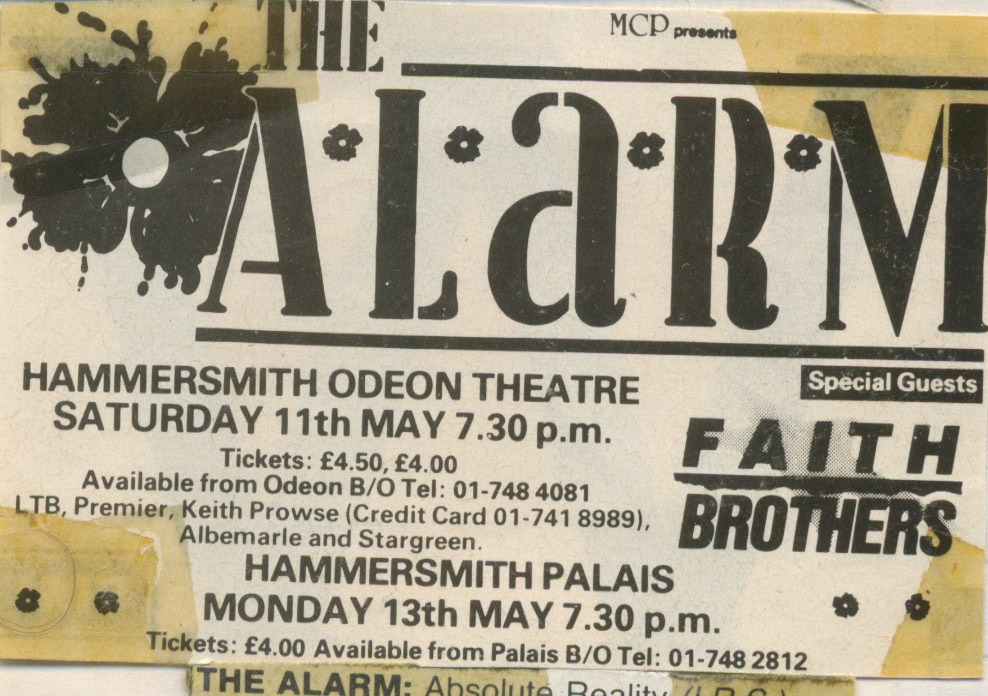
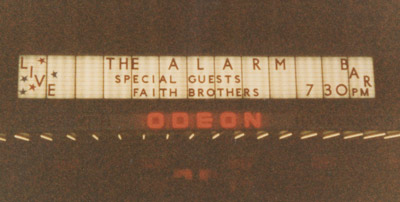
May 13th 1985 The Alarm Hammersmith Palais, London
The Alarm had been soundchecking and Mike had a platform built between the crowd and stage. After the band left, the safety people objected and had it removed. Nobody told Mike. The band went on stage to “Majority” and Mike decided to use the platform. He ran toward it, didn’t notice it wasn’t there, and the first view of Mike the crowd got was him falling to the floor. The words to “Majority” were changed that night to “I see a sea of faces staring down!” – Dirk Horst (The Alarm Archive Website)
“I do remember the time Mike fell off stage in the Hammy Palais. One thing I’m not sure that everyone noticed is that when Mike finally got himself back on stage and pulled out his harmonica to start “Shout To The Devil”, little did he realise that it had been crushed to the size of a slice of toast when he fell into the pit. The ensuing harp solo sounded like someone trying to blow one of those Christmas party trumpets! –Nigel Twist (The Alarm Archive Website)
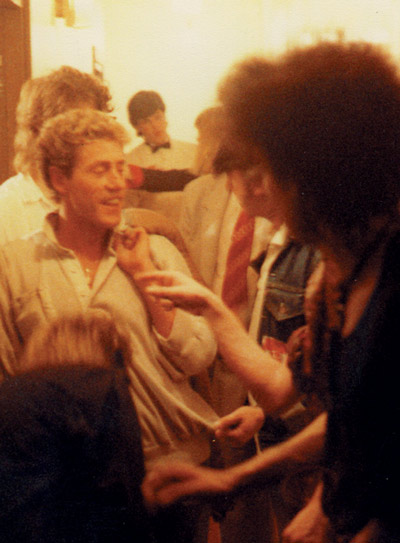
Photo – Roger Daltrey (The Who), and Alan Shacklock (wearing cap) backstage at Hammersmith Palais with Eddie Macdonald (right).
May 14th 1985 The Alarm Goldiggers, Chippenham
May 15th 1985The Alarm Queensway, Dunstable (see exclusive poster image at www.twitter.com/thealarm)
May 16th 1985 The Alarm King’s Hall, Stoke on Trent
May 17th, 1985 Pluto Studios, Manchester
Mike and Eddie recorded “In The Cold Light Of Day” for Alan Shacklock as a possible song consideration for Roger Daltrey, whom Shacklock was producing at the time (Under A Raging Moon). It was not used as by the time the tape got to London, all the songs titles for recording have been chosen (including After The Fire’ written for Roger Daltrey by Pete Townshend). The basis of the song eventually became “Only Love Can Set You Free” from the 1987 ‘Eye Of The Hurricane’ album.
May 18th 1985 The Alarm Queen’s University, Belfast
May 19th 1985 The Alarm The TV Club, Dublin
May 21st 1985 The Alarm Afan Lido, Port Talbot
May 22nd 1985 The Alarm Civic Hall, Guildford
“I was 16 and went with my mate to Guildford. The Faith Brothers opened that night and I instantly liked their brass-edged soul tinged pop. When The Alarm came on I can still distinctly recall be covered in goose bumps despite it being really hot in the venue. I was completely blown away and hooked by the band’s passion, tunes and presence. Since that day I have lost count of the actual number of shows I have seen to date, it must be liberally hundreds (including Mike solo and all the spin-of bands; Dead Men Walking, Children of the Revolution, Acoustic Terrorists, Los Mondo Bongo, Dave Sharp solo and with the Barnstormers, Westway…To the Clash, Coloursound and now Big Country). “ – Pete Cole (Life Long Alarm Fan)
With the Absolute Tour finished, and a top-40 hit under their belt with “Absolute Reality”, The Alarm started 1985 with a bang. They overcame the disappointment of losing producer Jimmy Iovine to Simple Minds, and with help from manager Ian Wilson and the scrappy crew at IRS Records, they turned everything around. Just 5 months into the year, they were ready record their new album, and prepare to conquer the world.
Come back to the alarm.com tomorrow as the story of Strength – An Oral History continues……
Strength – An Oral History. Created by Steve Fulton and Mike Peters. ©2019 www.thealarm.com
Strength 1985 – 1986 is released on Friday March 15th 2019 and is available in CD / LP and Download versions with a host of previously unreleased exclusive tracks across all formats.
Strength 1985-1986 is also available to pre-order at various international retail outlets.

